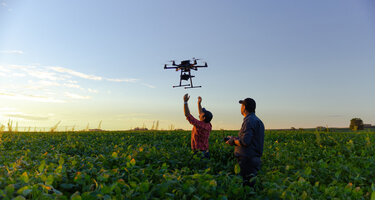Innovation for Agriculture (i4Ag)
Innovations in agricultural and food systems generally originate where they are grown and produced. Small farmers, companies, politicians and scientists work and conduct research along the global supply chains. They often develop practical solutions with enormous potential to effectively combat climate change, the threat to biodiversity, but also injustice and poverty.
About the i4Ag fund
i4Ag is a fund for the gender-sensitive promotion of innovations in the agricultural and food industry. The aim of the fund is to identify potential and to pilot, further develop and scale it with a comprehensive network of partners. In total, i4Ag is currently promoting and trialling 40 innovations, many of which are located in the global agricultural supply chains of raw materials such as cotton, cocoa, coffee, bananas and many more in around 32 countries. All projects have a model character and are intended to be transferable and scalable to other supply chains.
The portfolio of the i4Ag fund includes innovations that ensure the nutrition and climate adaptation of smallholder farms as well as the protection of natural resources such as soil, water and biodiversity. At the same time, the aim is to secure and create local employment opportunities and income, especially for women and young people, who make a significant contribution to the future and development of their respective systems.
By using modern technologies such as blockchain for the traceability of supply chains, artificial intelligence for crop protection monitoring and innovative water treatment systems in aquaculture, the fund is making a decisive contribution to making agriculture in the global South more sustainable and fit for the future.
i4Ag Fund is working with a large number of partners to ensure that innovative approaches, sustainable cultivation methods and resource-saving technologies become the standard worldwide.
About innovations in agricultural supply chains
In order to strengthen climate resilience, soil health and yield stability in cotton cultivation in smallholder Cameroon, the i4Ag fund promotes innovative solutions that sustainably support the transformation of the agricultural supply chain. These include the introduction of climate-resilient cotton varieties and the production of natural biopesticides, for example from neem. Innovative manufacturing processes improve pesticide resistance to UV radiation and thus increase the efficiency of the product. In addition, waste from cotton production is processed into biochar and enriched with other agricultural biowaste such as manure and legume biomass. This improves both the fertility and the water storage capacity of the soil, thereby increasing cotton yields.
The fund and its partners are also piloting innovations in the field of digitalisation at the beginning of the global cocoa supply chain. Cocoa is generally produced by smallholder farmers, and cultivation practices often contribute to deforestation. Despite increasing demand for sustainably grown cocoa, small farms that practise climate-friendly cultivation hardly achieve any income growth. The innovations in the Open Cocoa Chain project are a low-threshold digital open-source solution that can be used to trace deforestation-free cocoa in transnational supply chains. Smallholders feed their data into the blockchain via an app, become visible to all actors in the supply chain and can thus improve their market position.
The fund also supports projects in the field of mechanisation and establishes innovative approaches in the global coffee supply chain. For example, the aim is to support smallholder farmers with so-called "machine rings as a kind of self-help concept" through shared mechanisation solutions and machines, as they often do not have access to suitable machinery.
Bananas and plantains are also of crucial importance for food security, employment and exports in Latin America and worldwide. The aim of the i4Ag-funded ALER4TA project is to prevent the spread of the plant disease Fusarium TR4 in the Andes region. ALER4TA is a plant protection monitoring system based on artificial intelligence that enables rapid and efficient early detection of the disease across large areas and national borders. The measure also supports scientific research into the introduction of resilient banana varieties and ecological and sustainable cultivation methods.
In addition to the innovations in the aforementioned "focus supply chains" such as cocoa, coffee, bananas and cotton, others such as shrimps and rice, to name but a few, are also part of the SASI.
Rice is an important staple food for 3.5 billion people worldwide. 91 per cent of the rice yield is harvested in Asia. A significant proportion of the global rice harvest is produced in wet rice cultivation. This not only causes high water consumption, but also contributes to climate-damaging methane emissions. At the same time, rice cultivation itself is also heavily affected by climate change. Smallholder farmers produce the majority of the rice harvest and are therefore particularly vulnerable to the consequences of climate change. Women are particularly affected. They often have limited access to productive resources and agricultural knowledge, including innovative cultivation methods. The CORE project aims to capitalise on climate-sensitive rice cultivation practices, especially for women. This can be achieved through the pricing of rice or through the trading of saved emissions (carbon credits).
The situation is similar in the shrimp agricultural supply chain. Indonesia and Vietnam account for almost a quarter of global shrimp production. These are conventionally farmed in aquacultures using large amounts of water and chemicals. Here too, the increasing scarcity of water and the negative impact on local agriculture require rethinking towards more sustainable production. The aim of innovations in this context is to utilise water and nutrients more efficiently and improve water quality.
Further information on the fund's projects and innovations can be found here.
